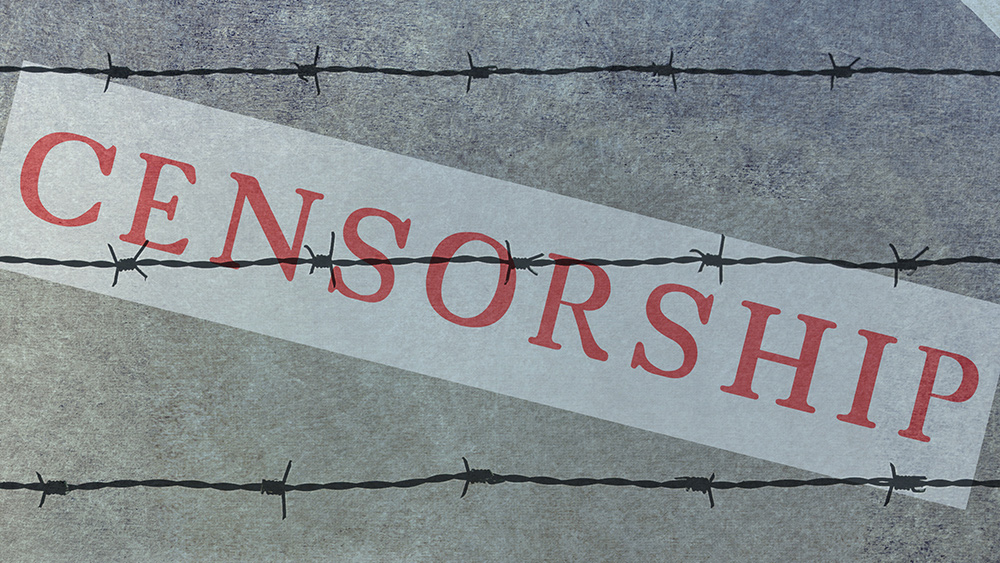Whistleblower documents reveal U.S. censorship-industrial complex’s efforts to control public discourse
01/16/2024 / By News Editors

Investigative journalists uncover details from whistleblower documents on the U.S. censorship-industrial complex’s attempts to police and criminalize divergent opinions.
(Article republished from YourNews.com)
Investigative journalists Michael Shellenberger, Alex Gutentag, and Matt Taibbi have brought to light documents from a “highly credible” whistleblower. These documents expose the workings of a vast U.S. censorship-industrial complex, comprising over 100 government agencies, private firms, academia, and nonprofits, focused on policing and repressing what they term as “wrong-think.”
“A whistleblower has come forward with an explosive new trove of documents, rivaling or exceeding the Twitter Files and Facebook Files in scale and importance,” the trio wrote on their Substack, “Public.”
“They describe the activities of an ‘anti-disinformation’ group called the Cyber Threat Intelligence League, or CTIL, that officially began as the volunteer project of data scientists and defense and intelligence veterans but whose tactics over time appear to have been absorbed into multiple official projects, including those of the Department of Homeland Security (DHS).
The CTI League documents offer the missing link answers to key questions not addressed in the Twitter Files and Facebook Files. Combined, they offer a comprehensive picture of the birth of the ‘anti-disinformation’ sector, or what we have called the Censorship Industrial Complex.”
The documents, named the “CTIL files” after the Cyber Threat Intelligence League, provide an in-depth look at the creation and operation of modern digital censorship programs. They reveal the involvement of the U.S. military, intelligence agencies, civil society organizations, and commercial media in these censorship efforts. Techniques used include the creation and deployment of sock puppet accounts for spying and influencing online discourse, propagation of specific narratives, and active discrediting of dissenters.
One of the key strategies detailed in these documents is the weaponization of the financial industry, particularly by the CTIL. This strategy aimed to cut off financial services to individuals who organize rallies or events, effectively stifling dissent by financial means. The documents indicate a deliberate attempt to bypass the First Amendment by outsourcing censorship tasks to the private and non-governmental sectors, with the understanding that if such actions were not legally challenged, they were considered legal.
The whistleblower highlights CTIL’s role in a counter-disinformation project intended to prevent events like the Brexit vote and Donald Trump’s 2016 election victory, both perceived as failures of information control. This initiative was not merely about combating false information but was a direct effort to manipulate and control democratic processes.
Further, the documents reveal the CTIL’s involvement in broader surveillance and censorship activities. For instance, a law enforcement channel was established specifically to monitor and track social media users posting anti-lockdown hashtags, and CTIL maintained detailed records of such users.
The CTIL files also exposed that the weaponization of the financial sector originated with CTIL’s explicit intent to impede financial transactions of those organizing events contrary to their narrative. The framework developed by CTIL was later utilized by entities like the World Health Organization for countering anti-vaccination campaigns in Europe.
Within one month of the CTIL’s founding in March 2020, this supposedly all-volunteer group had grown to 1,400 “by invitation only” members in 76 countries and officially partnered with the U.S. Department of Homeland Security’s Cybersecurity and Information Security Agency (CISA). As reported by Public:
“The CTIL framework and the public-private model are the seeds of what both the US and UK would put into place in 2020 and 2021, including masking censorship within cybersecurity institutions and counter-disinformation agendas; a heavy focus on stopping disfavored narratives, not just wrong facts; and pressuring social media platforms to take down information or take other actions to prevent content from going viral.”
Public continues:
“The documents also show that Terp and her colleagues, through a group called MisinfoSec Working Group, which included [Stanford Internet Observatory research manager Renee] DiResta, created a censorship, influence, and anti-disinformation strategy called Adversarial Misinformation and Influence Tactics and Techniques (AMITT).
They wrote AMITT by adapting a cybersecurity framework developed by MITRE … Terp later used AMITT to develop the DISARM framework, which the World Health Organization then employed in ‘countering anti-vaccination campaigns across Europe.’
A key component of Terp’s work through CTIL, MisinfoSec, and AMITT was to insert the concept of ‘cognitive security’ into the fields of cybersecurity and information security …
![idOeeDGd-image Whistleblower Documents Reveal U.S. Censorship-Industrial Complex's Efforts to Control Public Discourse Top Stories [your]NEWS](https://api-assets.infowars.com/2024/01/idOeeDGd-image.png)
The ambitions of the 2020 pioneers of the Censorship Industrial Complex went far beyond simply urging Twitter to slap a warning label on Tweets, or to put individuals on blacklists.
The AMITT framework calls for discrediting individuals as a necessary prerequisite of demanding censorship against them. It calls for training influencers to spread messages. And it calls for trying to get banks to cut off financial services to individuals who organize rallies or events.”
We are indeed “hackable animals,” as proposed by Yuval Noah Harari, and the censorship-industrial complex has been hacking into the very brain structure of billions of people for the last four years already. Gutentag even touches on this in a December 3, 2023, article:
“What was once considered a ‘conspiracy theory’ that military and intelligence forces were manipulating public opinion through inorganic interventions, has now been confirmed.
Our study of the Censorship Industrial Complex has exposed a far-reaching plan to subvert the democratic process and engage in activities that have a basis in military techniques and which are tantamount to attempts at thought or mind control.”
The CTIL files also show there was a clear intent to circumvent the First Amendment by outsourcing censorship to the private and nongovernmental sector. According to the whistleblower:
“The ethos was that if we get away with it, it’s legal, and there were no First Amendment concerns because we have a ‘public-private partnership’ — that’s the word they used to disguise those concerns. ‘Private people can do things public servants can’t do, and public servants can provide the leadership and coordination.’”
The “Middleware” Plan To Restructure The Censorship Industry
1. Middleware = ‘censorship as a service’ orgs
2. Morphing from top-down to middle-out
3. Regs + middleware = disinfo compliance market pic.twitter.com/lDPqH72HrD
— Mike Benz (@MikeBenzCyber) August 1, 2023
The complexity and scope of these operations underscore a significant shift in censorship tactics, moving from direct government action to more covert methods involving public-private partnerships. This shift represents a strategic circumvention of constitutional limitations on government censorship.
This exposé marks a crucial moment in understanding the extent of government-sanctioned censorship efforts and their impact on public discourse and democratic processes. It highlights the need for vigilance and accountability in the face of increasing attempts to control and manipulate public opinion under the guise of fighting disinformation.
READ THE FIRST CTIL FILES HERE
READ THE MOST RECENT CTIL FILES HERE
Read more at: YourNews.com
Submit a correction >>
Tagged Under:
Censorship, government, whistleblower
This article may contain statements that reflect the opinion of the author
RECENT NEWS & ARTICLES
COPYRIGHT © 2017 RULEBYSECRECY.COM
All content posted on this site is protected under Free Speech. RuleBySecrecy.com is not responsible for content written by contributing authors. The information on this site is provided for educational and entertainment purposes only. It is not intended as a substitute for professional advice of any kind. RuleBySecrecy.com assumes no responsibility for the use or misuse of this material. All trademarks, registered trademarks and service marks mentioned on this site are the property of their respective owners.




















